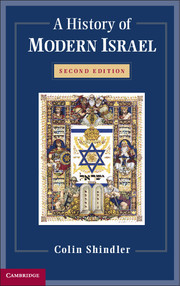Book contents
- Frontmatter
- Contents
- Illustrations
- Maps
- Acknowledgements
- Glossaries
- Chronology
- Preface to the second edition: Towards 2020
- Introduction
- 1 Zionism and security
- 2 The Hebrew Republic
- 3 New immigrants and first elections
- 4 The politics of piety
- 5 Retaliation or self-restraint
- 6 The Rise of The Right
- 7 The Road to Beirut
- 8 Dissent at Home and Abroad
- 9 An insurrection before a handshake
- 10 The end of ideology?
- 11 The Killing of a Prime Minister
- 12 The Magician and the Bulldozer
- 13 ‘He does not stop at the red light’
- 14 An unlikely grandfather
- 15 A Brotherly Conflict
- 16 Bialik's bequest?
- 17 Stagnation and Isolationism
- 18 An Arab Spring and an Israeli winter?
- Bibliography
- Index
- References
9 - An insurrection before a handshake
Published online by Cambridge University Press: 05 March 2013
- Frontmatter
- Contents
- Illustrations
- Maps
- Acknowledgements
- Glossaries
- Chronology
- Preface to the second edition: Towards 2020
- Introduction
- 1 Zionism and security
- 2 The Hebrew Republic
- 3 New immigrants and first elections
- 4 The politics of piety
- 5 Retaliation or self-restraint
- 6 The Rise of The Right
- 7 The Road to Beirut
- 8 Dissent at Home and Abroad
- 9 An insurrection before a handshake
- 10 The end of ideology?
- 11 The Killing of a Prime Minister
- 12 The Magician and the Bulldozer
- 13 ‘He does not stop at the red light’
- 14 An unlikely grandfather
- 15 A Brotherly Conflict
- 16 Bialik's bequest?
- 17 Stagnation and Isolationism
- 18 An Arab Spring and an Israeli winter?
- Bibliography
- Index
- References
Summary
The Man From Lehi
When Yitzhak Shamir succeeded Menachem Begin as Prime Minister in September 1983, he was perceived both by Herut and the country as a stopgap premier, a lacklustre grey necessity to stop the feared Ariel Sharon and the lightweight David Levy. At the age of sixty-eight, it was believed that Shamir would soon be put out to pasture before he reached the statutory three score and ten. Yet apart from the two-year hiatus of the rotational government, he remained in office until 1992 – only Ben-Gurion had served longer.
He personified neither the drama nor the depression of Begin. He made no memorable speeches and cared little about personal popularity. Unlike Begin, he projected no intellectual pretensions. A Likud election advertisement in 1984 characterized him as almost a grandfather type, yet 'his pleasant smile hides an iron will. Pressures won't bend him.' His world outlook was anchored in the example of the struggle of Lehi – the Stern Gang as the British dubbed it – in the 1940s and a deep ideological belief in a Greater Israel. Like Begin, he had emerged from the radical wing of Betar and joined the Irgun in 1937. In 1940, after some hesitation, he followed Avraham Stern out of the Irgun because the organization had stopped its military campaign against the British in order to cooperate with them in the war against the Nazis. Following Stern's death in a botched attempt by the British to arrest him, Shamir became the chief of military operations of Lehi. Shamir took the nom de guerre of ‘Mikhael' after Michael Collins, the Irish Republican progenitor of ‘modern guerrilla warfare, the first freedom fighter, or urban terrorist'. Like Begin, Shamir had studied the role of national liberation movements such as the Italian Risorgimento and the failure of the numerous Polish revolts. Shamir had been influenced at school through the works of Polish poets such as Mickiewicz and Slowacki.
- Type
- Chapter
- Information
- A History of Modern Israel , pp. 198 - 226Publisher: Cambridge University PressPrint publication year: 2013

